Search Results
Fine Jewelry University Articles matching: “Crown necklace”
Showing only FJU Article results. Click here to show all results.
Fine Jewelry University (Show All FJU Articles)
-
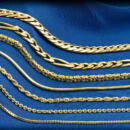
Types of Necklace Chains
… jewelry. But, what kind of chain is best for you? In this article we’ll introduce you to the staggering variety of necklace (and bracelet) chains that are available right now in the jewelry world. Each one has its own unique style, strengths… design. Like the cable and rolo chains, the box chain is flexible. The “sparkle” of this chain can enhance a necklace. PROS Modern Style – Box chains have a sleek and simple look which pairs well with a modern look. Flexibility – The …
-
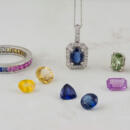
Gem in the Spotlight: Sapphire
…. It is also considered a booster for the immune system, protecting the body in general from disease. The British Crown Jewels Collection contains several sapphires. One of them, the Saint Edward’s Sapphire, is a large sapphire set in the … the Abbot of Westminster to the Royal British Treasury. The famous sapphire remains there, decorating the Imperial Crown ordered by Queen Victoria. Deriving its name from the Greek word for blue, sapphire used to refer to any blue stone. …
-
Understanding the Diamond Buying Game
… two could be a very poor cut (68%). Another way is both can have a 61.5% depth but diamond one has the correct crown to pavilion proportion and diamond two has a very deep pavilion and extremely thin crown. Other ways are how thick the …
-
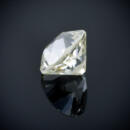
The History of Diamond Cuts
… earliest and most basic of cuts. It has an octagonal girdle (the side edge of the diamond) with a table and eight crown (top part of the diamond) facets plus eight pavilion (the bottom part of the diamond) facets plus a culet (the point … to 24 facets coming to a point in the middle. But its most recognized aspect is the flat bottom. Basically, it is a crown without a pavilion. Interesting fact #2: Some diamond cuts do not have a standard number of facets. As we have just …
-
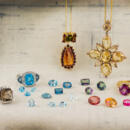
Gem in the Spotlight: Topaz
… to be the largest diamond ever found (prior to the Cullinan Diamond) at 1,680 carats and was set in the Portuguese crown jewels as such. It wasn’t until many years later that more modern testing identified it as a clear topaz instead. …
-
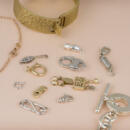
Types of Jewelry Clasps
… for you. History of Jewelry Clasps Jewelry clasps are a small but important component of many types of jewelry like necklaces, bracelets, and anklets. Clasps allow for easy attachment and removal of the jewelry and provide a secure way to … known clasp style. This type of clasp was often made from softer metals like gold or copper and used to fasten necklaces and bracelets. The hook-and-eye clasp was also used by the Greeks and Romans who often embellished them with gemstones …
-
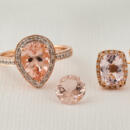
Gem in the Spotlight: Morganite
… and complexions. It is entirely appropriate for everyday wear, and it can be worn as rings, pendants, earrings, necklaces, bracelets, pins, brooches, or whatever else you can think of. Morganite is considered very affordable, especially … in California in the early 1900s. This means you won’t find any tales of ancient kings wearing Morganite on their crowns or other such legends. Morganite’s lore and traditions are more focused on gem power. Morganite as a power gem is …
-
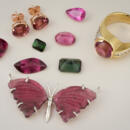
Gem in the Spotlight: Tourmaline
… Francisco Spinoza’s expedition confused its vibrant green with that of emerald. Thus began a long trend of confusing tourmaline with other gems. Another notable example of this is the “Caesars Ruby,” the 255ct stone in the Russian crown jewels that has been traded between France, Russia, and Sweden for centuries. It was long been believed to be one of the largest rubies ever found until it was identified as rubellite in 1922. Folklore suggests that tourmaline could help…
-
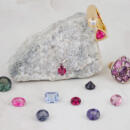
Gem in the Spotlight: Spinel
…, but until 1783 it was confused with more well-known stones like ruby and sapphire. One of the most famous examples of this confusion was with the Black Prince’s Ruby. This stone currently sits at the front of the Imperial State Crown of the United Kingdom. When it was given to Edward of Woodstock in 1367 it was thought to be a ruby. It wasn’t for nearly 400 years that it was determined to be a red spinel all along. Stories like this have been occurring regularly for …